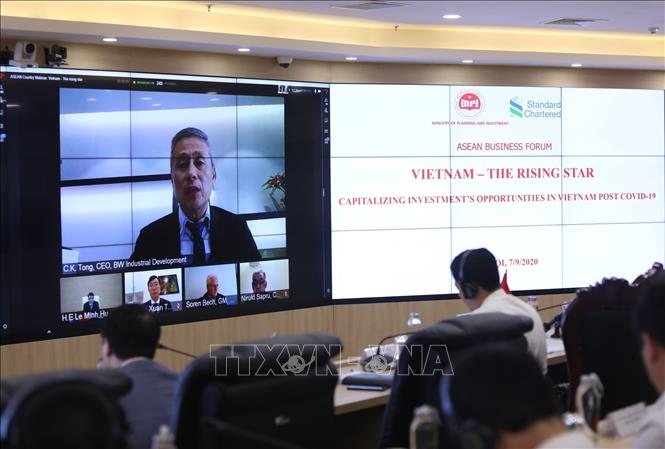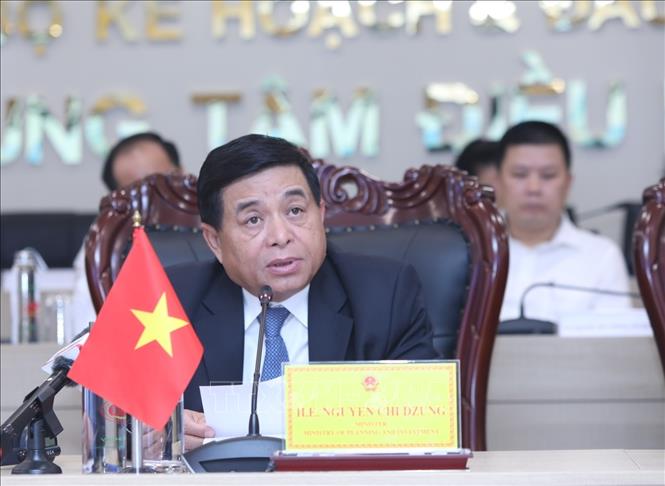Vietnam economy may surpass Thailand, Indonesia soon: Expert
As a production hubs of world major tech firms such as Samsung, Vietnam is capable of manufacturing sophisticated products with high technological content, said an expert.
Vietnam’s economy could surpass Thailand, Indonesia or the Philippines in coming years, according to C.K. Tong, CEO of BW Industrial Development, a joint venture between the US private equity fund Warburg Pincus and Vietnam’s Investment and Industrial Development Corporation (Becamex IDC).
| C.K. Tong, CEO of BW Industrial Development. Photo: VNA. |
Regardless of the Covid-19 pandemic, Vietnam has been gaining attentions from foreign investors, said Mr. Tong at an online conference themed "Vietnam - The Rising Star", discussing investment opportunities in Vietnam in the post-Covid-19 period on September 7.
Before the outbreak, many companies had adopted the “China plus 1” strategy, aiming to diversify operations into other countries instead of focusing solely on China, added Mr. Tong.
A growing production cost in China, coupled with its current trade tension with the US, has accelerated the process, during which Vietnam holds favorable advantages in receiving a new wave of foreign direct investment (FDI) from the “China plus 1” strategy, Mr. Tong stated.
According to Mr. Tong, Vietnam has the major advantage of being in close proximity with China that allows the former to access input materials from its neighboring country.
Moreover, there are some similarities in culture and production method between Vietnam and China, therefore, it would not take long for investors to settle in case they move production to Vietnam.
Another important factor is that Vietnam is capable of manufacturing sophisticated products with high technological content, Mr. Tong said, referring to the country being Samsung’s smartphone production hub.
Nirukt Sapru, Standard Chartered Bank’s CEO in Vietnam, ASEAN and South Asia Cluster Markets, stressed Vietnam as a gateway for investors looking for business opportunities in ASEAN.
Pointing to a survey conducted recently by the bank, Mr. Nirukt said 38% of respondents are planning to expand their supply chains in Vietnam, the highest rate among ASEAN countries.
| Minister of Planning and Investment Nguyen Chi Dung. Photo: VNA. |
Year to August 20, registered FDI for fresh projects in Vietnam increased by 6.6% year-on-year to US$9.73 billion while existing projects have been injected an additional US$4.87 billion, up 22.2%. This showed Vietnam remains an attractive investment destination globally, said Minister of Planning and Investment Nguyen Chi Dung.
To prepare for new investment inflows, Vietnam has been preparing in terms of infrastructure and human resources, so that the country could offer greater incentives and conveniences for investors, as well as enhance its national competitiveness in attracting FDI, added Mr. Dung.
Mr. Dung said the Vietnamese government is drafting the development strategy for the upcoming decade that prioritizes breakthroughs in legal framework, infrastructure and human resources.
Regarding the human resources, Vietnam is expected to push ahead with development plan before the year of 2030 when the demographic dividend is over.
Vietnam targets an average GDP growth rate of 7% per year, in which processing and manufacturing would contribute 30% of GDP and digital economy would make up 30% in the coming years, Mr. Dung informed.














